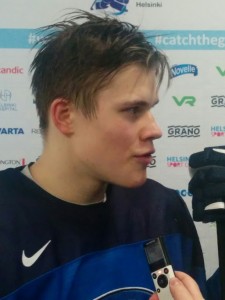HELSINKI, FINLAND – The host nation of Finland has captured World Junior gold for the second time in three years thanks to a thrilling 4-3 overtime victory over Russia. Let’s break it down and look at how they got it done.
Star Power

We’d be remiss not to talk about the top line of Finland consisting of Sebastian Aho, Jesse Puljujärvi and Patrik Laine. They were by far the best line of the entire tournament and often times carried the rest of the team when they weren’t getting any secondary scoring.
Let the arguments begin about who actually had the best tournament, as each of the three Finns deserve all the accolades they receive. With his 17 points, Puljujärvi ties Wayne Gretzky for second most points in a World Junior Championship by a player under the age of 18. The all-time record belongs to Jaromir Jagr.
Meanwhile, some hockey pundits say Patrik Laine had the best performance of the tournament. Craig Button of TSN actually puts Laine ahead of Puljujärvi in his draft rankings. Laine had a phenomenal tournament and seem to create the big play when Finland needed it most. It was also great to see him step up his physical game against Russia in the gold medal game and connect on a nice open ice hit.
And let’s not forget about Sebastian Aho. He was exceptional moving the puck up the ice and finding the open man. “I think Sebastian Aho was our best player,” said Julius Nattinen He likes to keep the puck and make nice passes and Puljujärvi and Laine make nice goal.”
Finally when it came down to crunch time in the medal rounds, the older, more experienced guys finally showed up. Colorado Avalanche’s first-round pick Mikko Rantanen was arguably Team Finland’s best players the last two games of the tournament and of course, Toronto Maple Leafs’ prospect (drafted in the first round by the Pittsburgh Penguins) was the hero scoring the golden goal.
Good Coaching
Team Finland head coach Jukka Jalonen was able to push all the right buttons and have his team prepared for whatever was thrown at them. We saw the Finns win in a variety of ways, whether it was in a shootout like the quarterfinal matchup against Team Canada or a type defensive game like against Team Sweden in the semifinal game.
Even when the team was trailing, as they were against Team Russia, they just kept pushing.
“Our coach told us that we must keep up our game,” said Nattinen. “We trust our game, our teammates and know that we can come back.”
As we already discussed, Jalonen made what can be considered the move of the tournament when he substituted goaltender Veini Vehvilainen for Kaapon Kahkonen. Team Russia head coach Valeri Bragin also tinkered with his crease by making multiple changes in goal, including starting Alexander Georgiev for Ilya Samsonov in the gold-medal game. Unfortunately for Bragin, his moves didn’t pay the same dividends.
Riding Emotion
Throughout the entire tournament the atmosphere inside the Hartwall Arena (where Team Finland played all of their games) was incredible. The team definitely fed off of the energy playing in front of the home crowd, and gave them the extra incentive to perform to the best of their abilities.
Finland 2 minutes from gold! #wjc #wjc2016 https://t.co/ouyOKAwusL
— Joseph Vito DeLuca (@joevitodeluca) January 5, 2016
This was best defined during the quarterfinals matchup against Team Canada. In the seesaw, 11-goal game emotions and momentum was shifting back and forth, but the crowd was behind the Finns the entire time. As Laine put it, “it’s an amazing feeling [playing in front of the home crowd].”
Overall, it can be stated enough how exceptional the entire tournament was from start to finish. With the energy, emotion and just pure desire to play the game and win, this is hockey at its very best. As we say adieu to Helsinki, let’s tip our hats to the host city on a job very well done! See you in Canada.